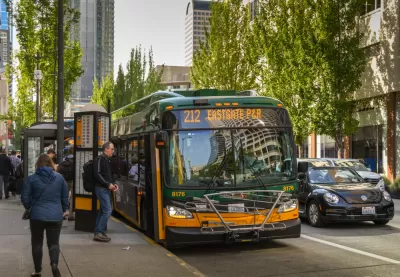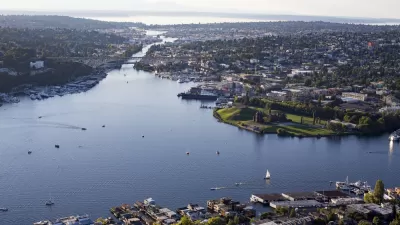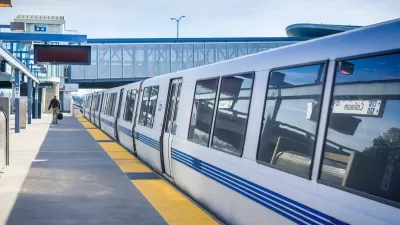Agency staff says the Puget Sound regional long-range plan won’t achieve 2030 sustainability goals set by the state.

The recently adopted Puget Sound Regional Council (PSRC) long range transportation plan won’t do enough to meet the region’s 2030 climate goals, reports Ryan Packer for The Urbanist. This is according to a report from the Council’s own staff, which revealed “a projected 13% gap between anticipated emissions and the goal of reaching a 50% reduction of the region’s 1990 greenhouse gas emissions by 2030, even with the help of numerous newly adopted statewide climate policies.”
Packer outlines the analysis made by PSRC staff, which claims that nixing planned road expansion projects in the region would not reduce emissions because that would increase congestion, a claim labeled by The Urbanist as “myth #1 on our list of five wrong planning claims around highway expansion that are causing the US to fail to make progress on its climate goals.” The predictive models used by PSRC also claim that improving transit wouldn’t make much impact, assuming that people would continue to drive at roughly the same rate, and that the most impactful initiative would be a per-mile road charge, an action that would require legislative action at the state level.
These predictions matter because the analysis is meant to inform how federal funding is allocated. “If the models show accelerating transit investments gets the region closer to its climate goals, there will be an effort to tilt funding in that direction.”
FULL STORY: Adopted Regional Transportation Plan Isn’t Aligned With 2030 Climate Goals

Planetizen Federal Action Tracker
A weekly monitor of how Trump’s orders and actions are impacting planners and planning in America.

Maui's Vacation Rental Debate Turns Ugly
Verbal attacks, misinformation campaigns and fistfights plague a high-stakes debate to convert thousands of vacation rentals into long-term housing.

Restaurant Patios Were a Pandemic Win — Why Were They so Hard to Keep?
Social distancing requirements and changes in travel patterns prompted cities to pilot new uses for street and sidewalk space. Then it got complicated.

In California Battle of Housing vs. Environment, Housing Just Won
A new state law significantly limits the power of CEQA, an environmental review law that served as a powerful tool for blocking new development.

Boulder Eliminates Parking Minimums Citywide
Officials estimate the cost of building a single underground parking space at up to $100,000.

Orange County, Florida Adopts Largest US “Sprawl Repair” Code
The ‘Orange Code’ seeks to rectify decades of sprawl-inducing, car-oriented development.
Urban Design for Planners 1: Software Tools
This six-course series explores essential urban design concepts using open source software and equips planners with the tools they need to participate fully in the urban design process.
Planning for Universal Design
Learn the tools for implementing Universal Design in planning regulations.
Heyer Gruel & Associates PA
JM Goldson LLC
Custer County Colorado
City of Camden Redevelopment Agency
City of Astoria
Transportation Research & Education Center (TREC) at Portland State University
Jefferson Parish Government
Camden Redevelopment Agency
City of Claremont





























